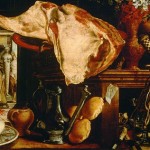 Luke 22:31-46
Luke 22:31-46
What a privilege it is to pray with our Lord Himself! That is exactly what we are doing here this morning in Luke 22: praying with Jesus in theGardenofGethsemane. In fact, what we are participating in this morning is nothing less than the Lord’s Prayer in action. In the Garden, Jesus is living out and praying through the one prayer He commanded His disciples to pray: the Lord’s Prayer. In so doing, the Great Teacher who is Himself the Truth is instructing us in the work of prayer once again.
We learn first that it was Jesus’ custom to pray on theMount of Olives, that is, to ascend the holy hill of the Lord in prayer. Jesus was not an amateur prayer but a professional one, and so He made sure He kept to a fixed habit of daily prayer. We learn next that Jesus knelt down to pray, and this helps to explain one of the reasons why the historic churches have kneelers in them, because posture in prayer is important.
Jesus begins His prayer by hallowing His Father’s name, by honoring it by coming before Him in prayer. In fact, Jesus always hallowed His Father’s name by doing the will of the Father and by keeping to His custom or habit of praying to the Father. We would do well, then, to follow Jesus in His habit of praying to the Father and of hallowing the Father’s name by turning to Him in prayer instead of living on our own.
Jesus is in the very process of bringing in God’s kingdom, which He is praying for because by His obedience as the Son theKingdomofHeavenhad come, was here, and was coming. In verse 29 Jesus tells His disciples that He is bestowing on them a Kingdom, just as the Father had bestowed it upon Him. This Kingdom was a kingdom of servanthood, of the greatest in the Kingdom being the most humble and serving. Jesus is, by His life of submission, even to the point of the Cross, manifesting theKingdomofHeaven. He is, in fact, bringing it in every time He obeys the Father. Likewise, every time we obey the will of the Father, the Kingdom of Heaven is not only coming but has come because where His disciples learn humility and obedience, there is the Kingdom.
“Father, if it is Your will, take this cup away from Me; nevertheless, not My will, but Yours, be done.” The humanity of Jesus in prayer in the Garden is so reassuring to me. Even the Son had to learn obedience and practice it by submitting His will to that of the Father. It was not automatic for Jesus. Jesus is allowed His petition before the Father. He is allowed, out of agony, to pray to be released from His terrible calling. But in prayer, He is perfectly submitted to the will of the Father. It is always about the will of the Father, and not our own will, and even the Son had to actively accept this.
The coming of God’s kingdom, in the Lord’s prayer and in our lives, is therefore organically connected to the will of the Father being done. Where the King is honored, hallowed, and obeyed, there is theKingdomofHeaven: first in Jesus, and then in His disciples. What an encouraging and blessed thought: that my mere obedience is the primary means of bringing God’s Kingdom to earth!
This will of God is to be done on earth as it is in heaven: completely (degree), immediately (speed), and cheerfully (attitude). As if to instruct us that the angels in heaven and all those who dwell in heaven perfectly obey the will of the Father, the Father sends an angel from Heaven to strengthen Jesus. It’s a good thing that this angel didn’t delay in coming when he was sent, that He didn’t get distracted on his way to Jesus. But that’s what happens to us as God’s angels or ministers. We don’t do His will, and sometimes that means that the prayers of God’s people aren’t answered as they should be, because we have not obeyed and not manifested His kingdom and power when we were asked to.
Where, we might ask, is Jesus’ daily bread, here in the Garden? Where is the good stuff that God promises? The fact is that the daily bread that the Father had given to the Son was to submit Himself to the point of death. Our daily bread each day is the day itself and all that God has ordained in it for us. If only we would learn to feed off of what He has actually given us each day, rather than feeding off of the imaginary bread of our dreams and fantasies and wishes. When the Father sent the angel to Jesus, notice that he didn’t come to change the will of the Father. The angel didn’t come to “answer” Jesus’ prayer and give Him what He had asked for, to be released from His terrible ministry. But the Father sent the angel to strengthen Jesus so that He could obey the will of the Father. That angel was, in fact, Jesus’ daily bread to enable Him to bring in theKingdom ofHeaven by obeying the will of the Father in saving the world.
While Jesus did not need to ask for forgiveness of sins, and we do, He is found here praying for His disciples that they will not enter into temptation but be delivered from evil and the Evil One. He says to them in verse 40: “Pray that you may not enter into temptation” and again in verse 45: “Rise and pray, lest you enter into temptation.” I’m reasonably sure that Jesus Himself was being tempted here in the Garden, just as Adam and Eve were tempted in the Garden. Just as Jesus was tempted at the beginning of His public ministry, I believe He was also tempted at the end and most crucial part of His ministry.
In fact, His temptation to do what is easier and less painful must have been acute here. Jesus is clearly in agony, and in agony He prays to the Father for strength and receives it. How true it is, as Luke records in verse 44, that being in agony we pray more earnestly. How blessed it is to know that when we are in pain and suffering and agony in this world that what Satan and men mean for evil the Father means for good. God uses this agony to provoke us to greater, more fervent prayer, and in so doing we are made like the Son in His earnest prayer of agony. If this is what it takes to bring me closer to God, this learning obedience through suffering like the Son, then bring it on!
The way to meet temptation is through prayer. This is the plain meaning of Jesus’ words to His disciples and to us. We think that by sheer will power we can resist temptation – but it is precisely our fallen, misguided, prideful willpower that will always fall into temptation and give in to it. In prayer, we redirect our will to God’s. Prayer, therefore, is always a primary means of bringing in God’s kingdom, because it is in prayer especially that our will is submitted to the Father’s, as Jesus shows us. In fact, this is the primary purpose of prayer: not that God does our will and “answers” our prayers, but that in praying we learn the will of the Father and how to submit to it by surrendering our wills to His.
When we pray and in praying learn to obey the will of the Father, then surely, like the Son, we manifest the kingdom, the power, and the glory of the Father. And this is why we were created. In prayer, you could say then, we are in Heaven itself, where the will of the Father reigns and is obeyed.
Why do we sleep, then? Let us rise this morning and pray!
Prayer: Father, teach me to pray today – that I should pray, how to pray, and what to pray. Instill in me the habit of prayer that I may more perfectly obey Your holy will and be made more like Your Son in all things.
Jesus, Teacher, teach me to pray today, and help me to follow You in praying the prayer You gave Your disciples throughout the day.
Spirit, strengthen and encourage me in my weakness, and deliver me from all temptations and weaknesses that will distract me from prayer today.
Point for Meditation:
Are you in the Garden of Gethsemane today in any way? Are you suffering a lack of anything necessary for the good of body, mind, or soul? Then learn of Jesus Christ to pray, even, especially in your suffering. Pray slowly through the Lord’s Prayer with Jesus, applying each phrase to your life today.
Resolution: I resolve today to pray.
© 2011 Fr. Charles Erlandson
CC Image courtesy of Librarian by dierk schaefer on Flickr















